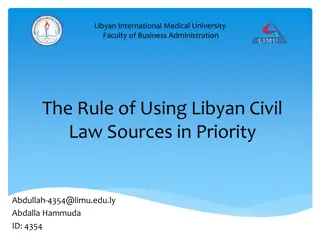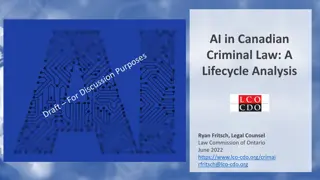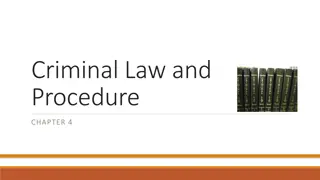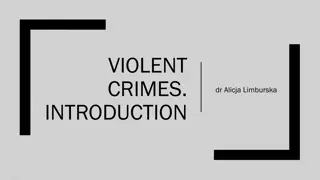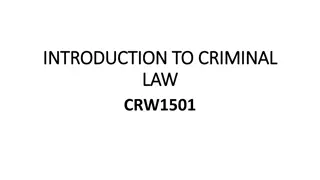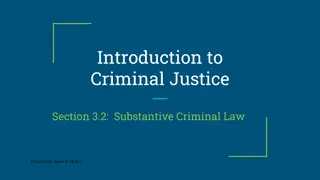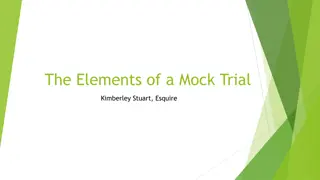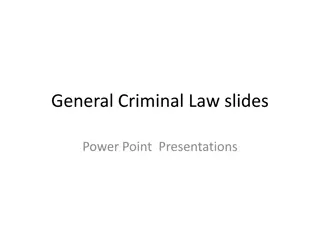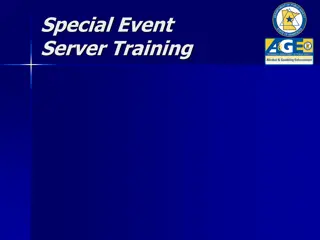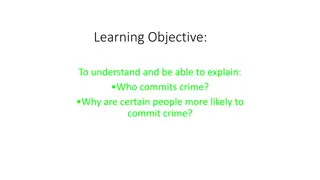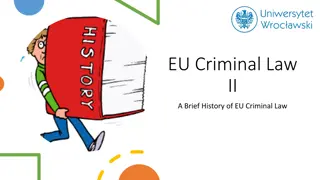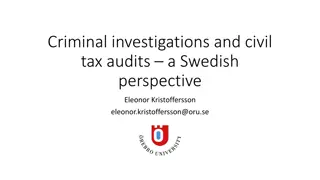Understanding Civil and Criminal Law Processes
Explore the differences between civil and criminal law, covering civil trial steps, Miranda Rights, pleadings, and more. Discover the nuances of civil trials, starting with a complaint, and criminal trials, which begin with an arrest. Learn about the Miranda Rights and the essential stages of a civil trial, from pleadings to verdict and judgment.
Download Presentation

Please find below an Image/Link to download the presentation.
The content on the website is provided AS IS for your information and personal use only. It may not be sold, licensed, or shared on other websites without obtaining consent from the author. Download presentation by click this link. If you encounter any issues during the download, it is possible that the publisher has removed the file from their server.
E N D
Presentation Transcript
Ch. 6 Business Law Review PowerPoint
CIVIL LAW TORTS Civil trials begin with a complaint. CRIMINAL LAW - CRIMES Criminal trial begins with an arrest.
The Miranda Rights Right to remain silent. Right to know crime for which you are being charged. Right to talk to an attorney before hand. Right to know the names of the arresting officers. Right to have an attorney present during questioning. Right to use the phone soon after being bought into the station. Right to a fair trial. Presumed innocent until proven guilty
Steps to a Civil Trial Steps to a Civil Trial 1. Complaint from Plaintiff Summons is filed & served 2. Answer by Defendant 3. Methods of Discovery Interrogations, depositions, requests for documents, medical & physical exams 4. Pre-Trial Hearing with Judge 5. Jury Selection Background, experience, relationships, attitudes, employment, education
Steps of a Civil Trial Steps of a Civil Trial Continued 6. Opening Statements 7. Introduction of Evidence Real evidence, documentary evidence & witnesses 8. Closing Arguments 9. Instructions to Jury by Judge 10. Verdict & Judgment 11. Execution of Judgment Continued
What is a pleading? A legal document.
Who files a complaint? The plaintiff
What pleading starts a Civil Trial? Complaint
What is the goal of each side of a civil case? To SETTLE out of court
Methods of Discovery interrogations depositions requests for documents medical physical exams
Things asked of prospective jurors. Background Experience Relationships Attitudes Employment Education
When in court which side presents their opening statements first. plaintiff
Who gives instructions to the jurors before they decide the verdict to any case? The Judge AKA - Impartial Referee
Decision of a jury VERDICT VERDICT
Written accusation issued by a grand jury. INDICTMENT INDICTMENT
Procedure in which accused pleads to the charge. ARRAIGNMENT ARRAIGNMENT
Formal written reply denying or admitting allegations of the complaint. ANSWER ANSWER
Jury of inquiry that conducts a preliminary hearing. GRAND JURY GRAND JURY
Courts decision or determination in a case. JUDGMENT JUDGMENT
Proceeding to decide whether or not to keep a minor in custody. DETENTION HEARING DETENTION HEARING
Statement of plaintiffs claim against the defendant. COMPLAINT COMPLAINT
Money or other property left with the court to assure the defendant s return to court. BAIL BAIL
Civil and criminal trials begin the same way. False. Civil begins with a complaint Criminal begins with an arrest
A grand jury is a jury of inquiry that carries on its own investigations. true
Failure to answer a complaint on time can result in the loss of the case by default. true
Juries are made up of people who are experts in the law. false
Criminal trials begin with the use of pleadings. False Criminal trials begin with an arrest
Documentary evidence includes objects such as weapons. False Documentary evidence consist of paper, contracts, receipts. Real evidence consists of weapons, guns, knives, etc.
The final charge to the jury is given by the defendant s lawyer. False. The judge, impartial referee gives legal input.
In a civil case, the decision of the jury must be unanimous. False Criminal case unanimous (everyone agrees) Civil case majority rule
School officials are allowed to search students without a search warrant if they have reasonable grounds. true
When an indictment is issued it means that the named person is guilty of a crime. False
Melissa Stinson was called for jury duty. She was selected to serve as a juror in a case in which her cousin was the plaintiff. The attorney for the defendant challenged her selection as a juror and asked that she be removed. Later, Melissa told a friend that she was removed because of the attorney s prejudice against her. Was she correct? NO
Ronald Borge was caught by a police officer inside a supermarket at night. The officer arrested him and, noticing the bulge in Borge s pocket, frisked him. Borge claims that he was illegally frisked. Do you agree with Borge? NO NO
Angela Callaghan won a civil suit against Jonathan Smith and received a $5,000 judgment. Smith had no money, was not employed, and owned no property. Smith told Callaghan that she would never be able to get the $5,000 from him. Was Smith correct? NO NO
Steven Ramos was named as the defendant in a lawsuit. A process server was directed to deliver a summons to Ramos. Not finding Ramos at home, the process server left the summons in Ramo s mailbox. Did Ramos receive proper notice of the lawsuit. YES YES


